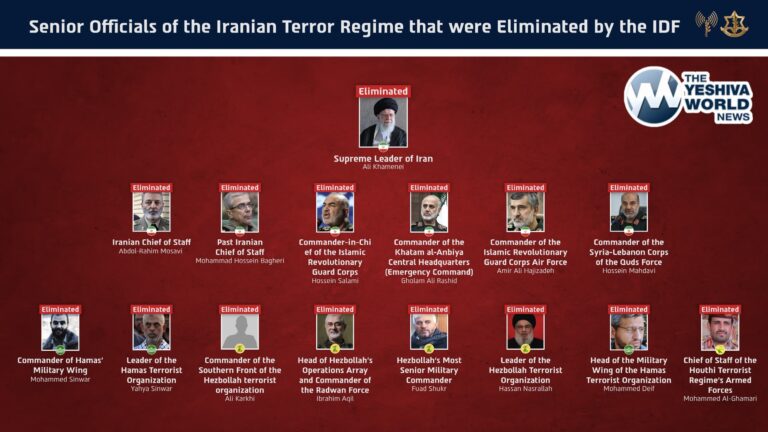By Rabbi Yair Hoffman for 5tjt.com
What follows is a halachic analysis of a developing story concerning a prominent synagogue in Manhattan’s Upper East Side. We will see that, generally, speaking there are prohibitions involved in opening up a rival business in close proximity to another existing business. We will also see that the prohibition does not necessarily apply to Torah competition because of the principle of “kinas sofrim tarbeh chochma- competition among scholars causes proliferation of Torah wisdom.” But we will also see that there are exceptions to the application of this concept as well. Of course, as in all matters of halacha, a person should always ask his own Rav or Posaik for specific guidance.
THE BACKGROUND
The Park East Synagogue in Manhattan’s Upper East Side is probably one of the most prominent and flagship Modern Orthodox synagogues in the nation. It’s Rabbi, Rabbi Arthur Schneier, is a sixth generation Rabbi. Last month, its assistant Rabbi, Rabbi Benjamin Goldschmidt, was fired. Rabbi Goldschmidt’s Rebbitzen is a prominent reporter and writer who often writes for the Forward, also a prominent institution (and a rival of the Five Towns Jewish Times).
And now, at least for the second time, Rabbi Goldschmidt has held a rival service, a mere three blocks away from the Park East Synagogue.
Apparently, the issue is so huge, that it has even become a JTA story.
According to the JTA story, Rabbi Goldschmidt had recently sent an invitation that invited people to a Shabbos morning service with lunch to follow at an elite event space a few blocks away from the Park East Synagogue. The invitation list also included members of Rabbi Schneier’s shul.
The JTA has further reported that approximately 80 people have already RSVPed for the Parshas Toldos service. “We are embarking on a new journey,” the invitation reads, “Join us for Shabbat Parshat Toldot. We look forward to seeing you!”
According to the JTA, both Rabbi Schneier and Rabbi Goldschmidt have laywered up. Hank Sheinkopf, a political consultant acting as a spokesperson for Rabbi Schneier, told the JTA that he feels Rabbi Goldschmidt is trying to “undermine Rabbi Schneier and undermine the community for his own self interest.”
Rabbi Goldschmidt’s attorney, Daniel Kurtz, told JTA that Rabbi Goldschmidt was organizing the service because he intended to continue his work in the community he’s called home for 10 years. “This is where he lives and where he’s a rabbi. This is his natural constituency. He’s not going to move to Greenwich, Connecticut, and start inviting people.”
THE HALACHA REGARDING A BUSINESS
Let’s imagine for a moment that we were not discussing a shul, but rather a popular Israeli Kosher Gourmet Market. What would be the halacha in such a case? We will begin with the relevant Talmudic passage and go onto Rishonim, the Shulchan Aruch, Acharonim, and more contemporary Poskim.
The Gemorah in Bava Basra (21b) cites a Braisah which rules that one may not spread his fishing nets in order to catch a fish which was near the nets of another fisherman. That braisah states that one must distance fish traps from fish, i.e., from other fish traps, as far as the fish travel. The Gemarah asks: And how much is this distance? Rabba bar Rav Huna says: Up to a parasang [parsa]. The Gemara responds that Perhaps fish are different, as they give a siraya – they look around and warn..
This Gemorah is somewhat unclear in regard to the fish distinction, but it is employed by the Rashba in a responsum (Teshuvas HaRashba Vol. III #83) to argue that it is forbidden for a second tailor in a community to open up a rival business in which a customer is lured away from tailor number one – and it was on account of tailor number two that the customer had abandoned his initial intention.
THE RAMA
The Rama cites the Rashba’s view and an opposing view in CM 156:5. He writes: “If a person had a maarufya – a steady business relationship with a gentile, there are some places who rule that other Jews may not enter his livelihood and deal with that gentile. and other places who do not rule such.”
Both the Vilna Gaon in a footnote (#28) and the Maharshal (#36) explain that there is a dispute among the Rishonim as to what ,exactly, the Gemorah is prohibiting regarding the fish. Those who permit it argue that business competition is different than fishing, since it is theoretically possible, that the customer will not choose to buy from the first seller. The Maharshal explains that the stringent opinion cited in the Rama holds that bais din would forcibly eject the second store who violated the prohibition. Although the Rama does not rule as to which opinion he prefers, the Maharshal rules that one should be stringent.
So regarding an Israeli marketplace, the halacha would seem that we should be stringent. The case of a shul or a school is different, however.
That same Ramah in 156:5, explains earlier on, that there is a concept of “kinas sofrim tarbeh chochma- competition among scholars causes proliferation of Torah wisdom.” The Chazon Ish in his Emunah uBitachon (3:1) explains that Hashem wishes to grow Torah knowledge and wisdom and thus preferred the needs of the many over that of the few. The Shoel uMaishiv (Mahadurah Tanina 1:13)writes that this applies across the board regarding a Torah instructor – whether it is a Mishna tutor, Gemorah tutor, or Chumash teacher. It does not apply to a secular studies instructor or tutor. Ostensibly, the exemption applies to Shul Rabbis as well.
What if the new shul or school would result in a complete loss of income to the first Torah teacher? The Chasam Sofer (Choshain Mishpat Vol. V #79) rules that it does not matter – the exemption still applies.
ANI HAMEHAPECH
The Talmud (Kiddushin 59a) tells us that it is forbidden to purchase an item when someone else has already entered into an agreement to purchase the item and a price has been agreed upon. The Gemara gives an illustration of such a case: Rav Gidel wished to purchase a certain property and Rav Abba ended up buying it. Although that case turned out different, it is clear from the Gemara that one who does so knowingly is labeled a rasha, an evildoer. This is also the halachah as codified in the Choshen Mishpat section of the Shulchan Aruch (237:1).
Rashi explains that the concept also applies to someone who is looking to obtain something for free, and it is not limited to cases of business dealings. The Baalei Tosfos disagree with Rashi and explain, based upon answering an apparent contradiction from another section of the Talmud, that it only applies to business dealings. The reasoning is that free items are almost impossible to be found. Therefore, the prohibition of ani ha’mehapech would not apply to something so rare.
APPARENT CONTRADICTION
We will see that whether the author of the Shulchan Aruch rules like Tosfos or Rashi is not so clear-cut. In 237:1, he cites the view of Rashi in the second opinion that he records. (In the Yad Malachi, he writes that, as a rule of thumb, the second opinion recorded is always the final ruling.) Yet in 237:2 it seems that the Shulchan Aruch is siding with the Baalei Tosfos. Indeed, the question of how the Shulchan Aruch rules may affect the underlying question we are dealing with.
That question, in fact, is: Does the prohibition of ani ha’mehapech also apply to hiring another person’s employee?
Let us look at the next case in the Shulchan Aruch. There the Shulchan Aruch rules that it is permitted to hire someone else’s tutor of Torah. What? It is permitted to poach someone else’s Torah tutor? Yes, it seems that, in fact, that is the halachah. Is it a moral thing to do? That is another question.
OTHER REASONS WHY A TORAH TUTOR MAY BE DIFFERENT
The SMA’s explanation. Rav Yehoshua HaKohen Falk (1555—1614), the SMA, explains (237:8) that since the essence of teaching Torah is to explain the concepts and to delve deeply in it, every Torah teacher is different, so finding the appropriate one is akin to finding something extremely rare. Since every teacher explains the Torah in a different manner, it is like not having two of the same items. The Yam Shel Shlomo (siman 2) concurs with this view. The Nesivos also states clearly that the Shulchan Aruch’s ruling that it is permitted to hire away another person’s Torah tutor seems to imply that he rules like Tosfos and not Rashi.
The Aruch HaShulchan’s explanation. The Aruch HaShulchan (C.M. 237:5), however, gives a different explanation for the Shulchan Aruch’s leniency regarding a Torah tutor. He writes that since it is a matter of a d’var mitzvah, it is permitted–even according to Rashi. The Aruch HaShulchan expresses the idea that the Shulchan Aruch is consistently ruling in accordance with Rashi’s view–the second recorded opinion.
Nonetheless, the Rema rules in accordance with the view of Tosfos that it does not apply to cases of hefker (abandoned items). Since the Tur, the Rosh, and virtually all other poskim rule like the Baalei Tosfos here, Ashkenazic halachah is that it does not apply to the rare cases of free items.
THE CAVEAT
However, there is one caveat. If his primary intent is to stop the income of the first melamed and to take his place – then it is forbidden because it falls into the following five prohibitions, according to Sefer Chukim uMishpat (4:1):
- The claim of “Ka pasakta l’chiusi – You have come to stop my means of living.”
- Ani hamehapech b’chararah – who is called a Rasha – an evil-doer.
- Ani hamekaf berosh hazayis. The Gemorah in Gittin 59b discusses a case of a poor person who is collecting olives at the top of an olive tree and olives fall to the ground under the tree. Those taking the olives that are below are considered robbers on account of “Darchei Shalom – the ways of peace. Rabbi Yossi says: This is full-fledged robbery.
- Damaging the income of another person indirectly through a grama. There are two types of indirect damage. There is an indirect form of damage called “Garmi.” A Garmi is when the indirect form of damage is a clear, present and highly likely result. [If Reuvain were to rip up Shimon’s train ticket, for example, that is a Garmi form of damage. If Reuvain were to poison Shimon’s dog by placing a poisonous food next to him, this is considered Gramah not Garmi. It may very well be that Shimon’s animal will not eat the food.] Garmi damages are enforceable in a Bais Din. Gramah damages are not, but they are chayav in shamayim and are certainly forbidden
- Removing someone who is muchzak in a Mitzvah from his task (See Rav Moshe Feinstein zt”l, Igros Moshe CM I #60; and Rav Shlomo Zalman Auerbach zt”l, Minchas Shlomo, Vol. I #87).
Both Rav Vosner zt”l in his Shaivet HaLevi Vol. VII #228 and Rav Nosson Gestetner in his L’horos Nosson Vol. IV #118 forbid a Maggid shiur in a Yeshiva to open a new Yeshiva and recruit students from his previous Yeshiva in a manner that the original yeshiva will close on account of his actions.
CONCLUSION
If the disagreement were about the propriety of opening a rival business – it would likely be forbidden. However, since we are talking about a rival synagogue, it seems that it is permitted. If, however, the goal is utter destruction of the original synagogue, then it would be forbidden. It is highly unlikely, however, that this is the intent of the former assistant Rabbi. We should all have in mind that “kinas sofrim tarbeh chochma.”
*** PLEASE HELP A TZADAIKES AND TZADDIK GET MARRIED (THEY ARE BROKE)***
RABBI YAIR HOFFMAN IS VOUCHING FOR THIS. PLEASE CLICK ABOVE!!
The author can be reached at [email protected]












15 Responses
This bldg is still reeking with טומאה from the pope having set foot in that bldg minutes before קבלת שבת ערב פסח תשס”ח.
Is Rabbi schneier running a dictatorship who appoints his own Board of Trustees, and doesn’t give the membership any say electing them? What are the plan for the future of this Shul, having destroyed the good plan that had been in place?
Rav Goldschmidt שליט”א is a gem, as are his illustrious parents & grandparents whom I know well, and Rabbi schneier just killed the best future that his Shul members deserved.
To open a new shul- great! If someone chooses to leave his regular shul to daven at the new shul – that is normal and has been done many times. After all the area is home to many daveners.
But to recruit and entice by sending invitations to members in good standing who daven regularly at a nearby shule asking them to join his new minyan (the words “embarking on a new journey” suggests permanence and not one time off like you would do if invited for a simcha)- and with the extra promise of a meal, doesnt seem ethical to me.
I can dan lekav zchus that Rabbi Goldshmidt doesnt want to destroy his former employer, just build his own shul. I have to question which Rav gave him permission to do what he did.
If he were to just open his doors and welcome anyone who comes along, providing warm davening environment and a Shabbos meal, that would be OK, after all the area is home to a large enough pool of daveners and perhaps those who dont find their home elsewhere will be comfortable by him. BUT to invite, recruit, entice etc., doesnt shtim. I have to question what kind of Rabbi he is and will be. I also assume that others will do to him as he did to his former employer. IS this the example we want to give to our children???
Yasher Koach for a wonderful article! Glad you recovered from the COVID!
What about המלבין פני חבירו ברבים אין לא חלק לעולם הבא?
I am not clear as to why this article left out entirely.
147,
while we concur generally on this one you’re out .
this R. Goldschmidt and his wife have fallen a bit far from the tree or perhaps was something inappropriate to begin with
anyone who peruses of recent years their public writings of this Goldschmidt and more so his wife .. come to the conclusion
Thank you for a wonderfully researched article, as always.
‘A sixth generation Rabbi’
Wait, is that supposed to be a maalah? I thought that was meant לגרעותא
Whatever the Halachic pros and cons of breakaway Minyanim, all this is when the current Minyan is opened to all the locals.
Since Park Avenue Synagogue has instructed their security guard to banish Rav Goldschmidt shlita from entering their bldg and attending Minyanim even as a private person, since like every Jew, Rav Goldschmidt shlita is obligated to daven with a Minyan, it is totally reasonable to set up another Minyan, close to his residence.
isn’t this supposed to be resolved by a beis din? why would they hire secular lawyers?
Why was he fired?
the old Park East leadership of flaws that are egregious and serious when it comes to Judaism retain still the gentility and the manners that come with centuries of living Western educated countries. That is something that Israeli..
Who asked the shaila?
Look at who R. Arthur Schneier’s son is. More need not be said. And while you can’t blame the father for the son’s sins, that elder Schneier is no tzadikil himself.
Regarding “Rebbetzin” Goldschmidt, is this article supposed to be in the humor section. She hardly comports herself as a Rebbetzin. She neither dresses as a Rebbetzin, nor does she act as one. He Loshon Hora and sheker articles is her day job.
I also attend Park East . I can say from first hand knowledge that both Rabbi Schneier (who I have known for 50 years) and rabbi Goldschmidt (who I have known for 7 and worked with during Covid) are sincere and special people. if given the chance they could have worked things out. Unfortunately as is too often the case chatter and other agendas get in the way. I wish there was a way this could be put back together as I don’t believe any rupture is permanent (yaakov taught us that more than once). I’m
Not sure either reads the comments to yeshiva world but if you do please heed my words and join hands .
Anyone know how to contact Rav Benjy or who to contact to rsvp for Rav Benjy’s upcoming Parshas Toldos Shabbos in the Upper East Side’s Harold Pratt House?
Wishing all the best and only simchas for klal yisroel.